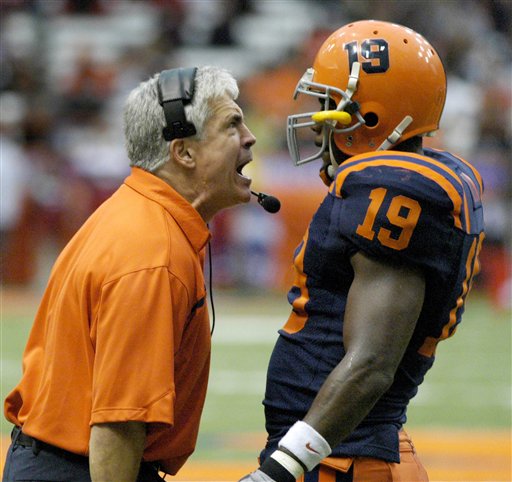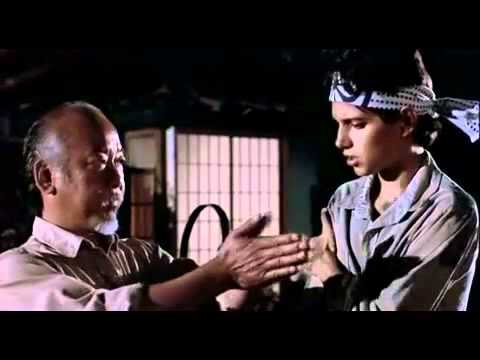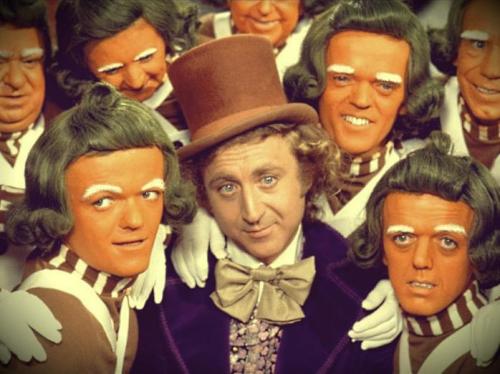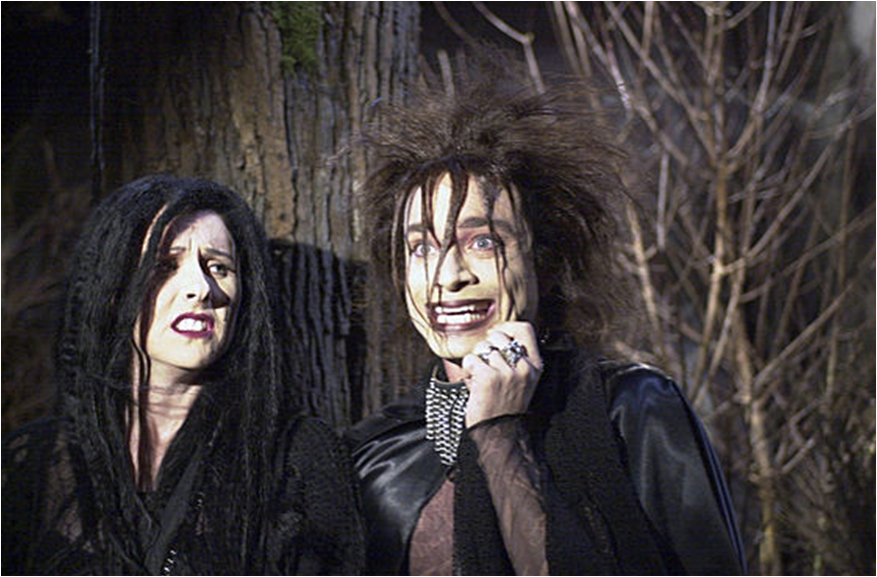One argument for never paying close attention to song lyrics is the fact that the moment you do, you immediately discover that what you originally thought was romantic is quite the opposite on closer examination. Romance is all about leaving something to the imagination, as well as treating the one that you love as if they were the only one in the world. When once either of these concepts are compromised, you get this list of the most romantic songs that really aren't:
10. I'd Really Love To See You Tonight - England Dan and John Ford Coley

We all know that "playing it cool" is the approach that one takes when trying to attract the attention of a girl, but this duo brings this tactic to new heights. With a remarkable air of disinterest (if not indifference), the protagonist of the song explains to this nameless girl that he would "really love to see her tonight", which would be fine if it ended there- but alas! It does not. Instead, he chooses to make his grand plans available to all; "We could go walkin' through a windy park, take a drive along the beach, or stay at home and watch TV, you know it really doesn't matter much to me". Impressively, the song gets even worse than that. "I'm not talkin' 'bout movin' in, and I don't want to change your life, but there's a warm wind blowing the stars around and I'd really love to see you tonight." Do you see rainbows and unicorns yet? I could be wrong, but I think he just tried to proposition her while simultaneously suggesting that this is the most thoughtful thing he could do. Apparently even "movin' in" is setting the bar too high for this Casanova. Come on, ladies! Who could resist a man who wants to be with you primarily because there's a "warm wind blowin' the stars around" ?
Lesson: You ruin a love song when you act like the woman that you are singing about really isn't worth the creative effort... that is, unless she decides to sleep with you
9. Amie - Pure Prairie League
I don't know what it was about the music in the 70's, but there seemed to be a whole genre dedicated to romantic mediocrity. Music has always told the story of this or that ne'er-do-well, but never had it so audaciously tried to convince us that women really don't want a passionate loving man so much as an existential coach potato. At any rate, this nonchalant attitude was indicative of what many felt at the time.
Amie is no exception. Equipped with a pleasant, laid-back melody, and a quiet, if not shy, vocal performance, one could get the impression that this ballad is nothing more than a sweet, down home, southern-fried classic. What it is instead is the same old mealy mouthed indecisive half-plea to a girl to
maybe come back to him; "Which way we should turn together or alone, I can never see what is right or what is wrong... I keep fallin' in and out of love with you... don't know what I'm gonna do." Well, it's good to hear your thoughts on the matter, and I cannot imagine that Amie would have the strength to resist such a heartfelt invitation to vacillate with you for all of eternity. The chorus is the most telling of all; "Amie, what you wanna do, I think I could stay with you for a while, maybe longer, if I do." Listen buddy, don't write a check that your butt can't cash. After all, how could any one hope to be true to a woman for "a little while," or dare I say it, "maybe longer."
Lesson: You ruin a love song when you are terminally indecisive and ambivalent about the girl you claim to care deeply for
8. Fooled Around and Fell In Love - Elvin Bishop
"I must have been through about a million girls/ I'd love 'em and I'd leave 'em alone. I didn't care how much they cried, no sir/ Their tears left me cold as a stone. But then I fooled around and fell in love... since I met you baby"
You've got to love this guy. Notice, he doesn't say "I must have been
with about a million girls, which would be disgusting enough- he uses the word "through", as if they were some sort of wiping agent. He then proceeds to admit, without even an ounce of compunction, that in spite of the misery he's inflicted, he's about as affected by the whole thing as those terrifying beasts in those Alien movies, or at minimum, that android from the second Terminator film. And so what kind of reward does he receive for all of his dallying? He meets the love of his life! How? He meets her while he's cheating on one of those million girls he's purported to have been
through. Karma must have taken the day off. I mean this guy is so awful that even the Prodigal Son, who himself wasted all of his father's money on prostitutes, thinks that this guy got off easy.
Lesson: You ruin a love song when you live happily ever after in spite of the fact that you have spent the majority of your life treating women like garbage
7. Little Jeannie - Elton John
For the most part, this song is quite endearing. It is about some young girl named Jeannie (since she is referred to as "little Jeannie" I wonder if she's related in any way to "tiny dancer", but I digress) coming up in the world, who is wearing herself out searching for "some lasting truth". Not a bad thing to wear yourself out for. In the mean time the lyricist (Bernie Taupin) professes his deep and abiding affection for her, all the while sympathizing with the struggles that she has apparently endured. All the same, with one stroke of the pen this quaint little ballad takes a rather awkward turn.
"And I want you to be my acrobat/ I want you to be my lover..."
Is she a gymnast? And if so, what exactly does that have to do with the song? Does he have some sort of pommel horse at his house, or a set of uneven bars? In any case, whatever the implications of this reference, it is nonetheless a strange one. Either it is a non sequitur about his desire for his girlfriend to join the circus, or what is more likely, one of those off-putting "TMI" moments where someone tells you about their sexual exploits. But wait, there is one more particularly uncomfortable moment in the song that comes at the end. Just when you thought you successfully put that whole acrobat business behind you, this line hits you right between the eyes;
"...And I want you to be by my acrobat/ I want you to be my lover/ But oh there were others/ And I've known quite a few..."
Really?!? Was that necessary? Here you wrote a nice song about how much you love "Little Jeannie," and then you go and ruin it by saying in essence; "you ain't the first babe, and far from it." File that under stupid things that men say to ruin a tender moment.
Lesson: You ruin a love song when you arbitrarily bring up the acrobatic flexibility of your partner- only to conclude your song with a mystifyingly insensitive detail about the number of women you have slept with in your life
6. As Long As You Love Me - The Backstreet Boys
"People say I'm crazy and that I am blind, risking it all in a glance... Don't care what is written in your history as long as you're here with me... I don't care who you are/ Where you're from/ What you did/ As long as you love... Doesn't really matter if you're on the run, as long as you're here..."
File this under the category of the lowest standards for a relationship in human history. The real question is what do you do if the girl really does want to start talking about her past- do you just start going "la la la" I'm not listening... as long as you love me? I thought the whole idea of loving a person involved precisely everything he so blithely swears off; (viz. who you are, where you're from, what you've done). Without an answer to these questions, the person who you apparently "love" would in effect have no identity at all, and if you don't care about that, then the statement "as long as you love me" is a completely an egocentric one. Don't get me wrong, she may be a perfectly nice girl, but by the standards set forth in the song, you may just as well be singing about a sex offender, Adolph Hitler, a serial killer, or someone in a bath house.
Lesson: You ruin a love song by suggesting that you have absolutely no standards whatsoever when it comes to women... as long as they love you
5. Private Dancer - Tina Turner
This is an example (for me at least) of one of those songs that you listen to a thousand times and never notice what it's about, because the chorus is the "hookiest" part of the song. Then on some random occasion you decide to pay close attention to the rest of it, only to realize that the song is about a "hooker." OK, not technically, but the song is about exactly what the title advertises:
"Well the men come in these places/ And the men are all the same/ You don't look at their faces/ And you don't ask their names. You don't think of them as human/ You don't think of them at all. You keep your mind on the money/ Keeping your eyes on the wall... I'm your private dancer/ Dancer for money, and any old music will do. I'm your private dance/ Dancer for money/ Do what you want me to do..."
In romantic ballads, you get so used to hyperbole, that you just assume that the reference to "private dancer" involves, however over-the-top, some sort of romantic interlude. In fact, I think initially in my naiveté I thought it was about someone giving ballroom dancing lessons or something like it. Ironically, in some ways I find this song a bit refreshing, especially considering that it is an honest attempt to literally tell the woman's side of the "exotic dancing" story (which is certainly not romantic); that, as opposed to another one of those trashy metaphorical songs about someone's sexual fantasy.
Lesson: You ruin a love song by overusing romantic cliches to the point that they are rendered utterly meaningless (the fact that I never noticed what this song was about until recently demonstrates just how empty and casually terms of endearment are tossed about in these songs)
4. I'm Saving All My Love - Whitney Houston
This ballad is just vague enough that a young man (I think I was about 13 when it came out) could easily miss what this song is really about. As is the case with the former song, all you tend to notice is the hook line in the chorus, as opposed to the larger context. If all you pay attention to in the song is "I'm saving all my love for you..." and then ignore; "A few stolen moments, is all we can share. You have your family, and they need you there"; then you will likely have a very different experience of the song. As a boy, I always interpreted this in a much nobler fashion. Well, gosh, maybe his mother is very sick, and he has to care for her, leaving too little time for the both of them. Uh.... not exactly. Here are a few more lines that pretty much hit you over the head with the real meaning of the song:
"It's not very easy living all alone/ My friends try and tell me find a man of my own... You used to tell me we'd run away together/ Love gives you the right to be free. You said be patient/ Just wait a little longer/ But that's just an old fantasy."
One of the things I appreciate about the song is the subtlety of it. Good artistry for the most part is never overly blatant. This allows the listener to come to understanding of the song at his or her own pace. Nevertheless, this song is far from romantic in the end, for in spite of the fact that this guy is clearly just going to string her long (oh and that minor detail about him having a wife and kids), she's going to hold out for this big nothing burger until she's an old maid. Why? "'Cause each time I try/ I just break down and cry/ 'Cause I'd rather be home feeling blue..."
Lesson: You ruin a love song by making it about a simpering mistress who doesn't care a fig about destroying a family as long as she gets her man.
3
. Hot Child in the City - Nick Gilder
Not only is this song not romantic, it is illegal twice over. The hot child in the city that he is referring to
is in fact a child, and as if that weren't enough she is, uh, well, a child prostitute on top of it all.
"Danger in the shape of something wild/ Stranger dressed in black she's a hungry child... So young to be loose and on her own/ Young boys they all want to take her home... Come on down to my place baby/ We'll talk about love. Come on down to my place women, and we'll make love! Hot child in the city."
In the 1960's, when the Rolling Stones played the Ed Sullivan Show, they were told to replace the line "let's spend the night together" with "let's spend some time together". What a difference a decade makes! If you thought for a second that this guy (and I use that term loosely) was singing about the tragedy of underage runaways being exploited in the city, you would be right. What you might not have suspected is that the songwriter himself seems quite content to perpetuate that process of exploitation. Not since the introduction of "Huggy Bear" have we seen such an attractive image of the relationship between child prostitute and a pimp. Hot indeed! Anyhow, considering Mr. Gilder's slight appearance, as well as his less than masculine singing voice, it did occur to me that a payment of some sort might be necessary in order for any girl to "come on over" to his place at all. Incidentally, why are prostitutes in movies and music almost always presented in the most attractive light? How about a "Pretty Woman"-like movie where the object of one's desire is a toothless meth addict (cue the theme song from Pretty Woman)? Wouldn't that be a little more true to form?
Lesson: You ruin a love song by attempting to romanticize what is perhaps the least romantic thing in the history of the world (viz. child prostitution)
2. All I Want To Do Is Make Love To You - Heart
This song leaves me at a loss as to what to say about it, for it combines a level of moral vacuity and stupidity that heretofore was unimagined by me. I must simply tell you what the song is about and let you decide for yourself. The title sounds as if it were your typical romantic schlock. However, this again is another case where the title is to be read literally in order to get the gist. No really, that is all she wants to do... "make love to you". As the story goes, she's driving one night and there's this dude on the side of the road standing in the rain, so she picks him up, concluding that he is sufficiently hot and seems harmless enough (which is a reasonable enough thing for a woman to think, right?) She then proceeds to stay the night at a hotel with this guy whom she is careful to learn nothing about, including his name. By the way, this hotel, as the song informs us, is a "place she knew well". I am not sure why the lyricist (Mutt Lange) felt the need to tell us this- other than to imply that perhaps she liked to bring all of her boys there. Who knows? Next we are told that they make love all night, love like "strangers" (which seems highly appropriate for the amount of time they have been acquainted). In the morning she leaves him a note, which says in essence 'Look, I really appreciated the service you performed for me last night. You see, my husband is shooting blanks, so I needed a good sperm donor. Oh by the way, if you still don't understand, here's a little botany lesson; "I am the flower/ You are the seed/ We walked in the garden/ We planted a tree... Now stay the hell away!" Love, Nancy. And if that weren't enough bombast for you, the last verse informs us that it "...happened one day, we came 'round the same way. You can imagine his surprise, when he saw his own eyes..." I mean what does this guy do with his time anyway? Does he just walk around at night in the rain hoping for some random chick to pick him up (which we all know happens all the time), generously offering to impregnate any women who unfortunately happens to be stuck in a marriage where her husband has fertility issues?
Lesson: You ruin a love song by imagining that songs about anonymous sperm donors could be, by any stretch of the imagination, romantic
1. To All the Girls I've Loved Before - Willy Nelson and Julio Iglesias
"To all the girls I once caressed/ And may I say I've held the best/ For helping me to grow/ I owe a lot I know/ To all the girls I've loved before. The winds of change are always blowing/ and every time I try to stay/ The winds of change keep blowing/ And they just carry me away..."
Ah, it doesn't get much more romantic than Julio Iglesias, does it? As for Willie Nelson, well, he did write that beautiful song called "You Were Always On My Mind". At any rate, both he and Willie Nelson set out to do a romantic ballad dedicated to "all the girls they've loved before." The question is: can a song be about a litany of nameless women and still have the savor of romance? Perhaps if the song were about nameless martyrs, but alas, it is not- it is simply about a host of women who share one thing in common: they have all been bedded by one (or both) of these men. And it is for this reason that songs about harems can never be romantic. As could be said by anyone who knows anything about a woman, women feel special only to the extent that they are made to feel special. They wish to feel, in the best sense of the expression, set apart. They do not feel particularly "set apart" when they must in essence take a number behind another nameless mound of flesh. And so having Julio and Willie sitting around exchanging anecdotes about women whose names they may or may not remember- who happened to shuffle in and out of their door- does not exactly make the eyes moist with nostalgia. Check that, it may make some spinster feel important for a moment or two- just as it may make these good old boys feel proud of themselves, especially when comparing numbers, but as for the majority of the women out there who have any sense of shame, it must be an all too unpleasant reminder that they were never anything more than a service to these men. After all, the lover always calls his beloved by name, and never once in this song is anyone names. At least in the song Mambo #5 the girls were significant enough for Mr. Bega to provide a whole litany of them (which might introduce a whole different set of problems altogether). Indeed, it would have been better not to have thanked them at all, rather than to have thanked them in this way. And what if she's married by now and her husband knows anything about it; "To all the girls who shared my life/ Who now are someone else's wife (yuck)/ I'm glad they came along/ I dedicate this song...". It is difficult to imagine any scenario in which a husband wants to hear another man reminisce about how he slept with your wife, and then subsequently disposed of her out like yesterday's garbage. But hey, at least she did have a song dedicated to her, right? Uh, well, sort of.
Lesson: You ruin a love song by generically expressing your affection, not for one woman, but for a whole host of them. No greater indignity has woman than this- than to be tossed into a bin (or rather harem) of nameless women, only to be thanked indiscriminately along with the rest of them

































